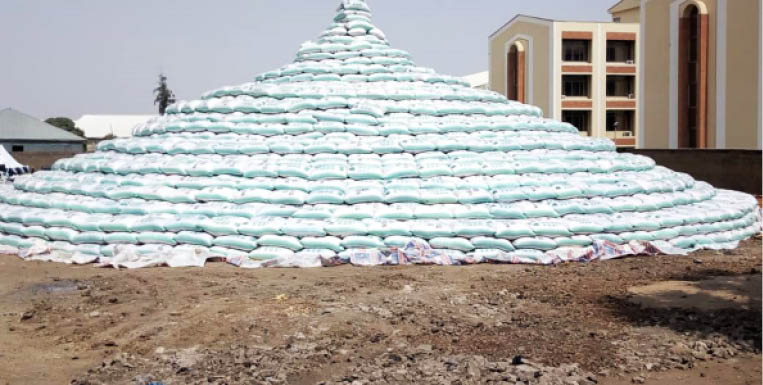Probe grains mop up
An investigative report published by Daily Trust last week exposed the unwholesome mop-up of grains from local markets by desperate government agencies to cover up failed policies and strategies. Happening at a time when hyperinflation has caused the prices of food items to skyrocket beyond the reach of the average household, the mop-up raises questions […]

file photo
An investigative report published by Daily Trust last week exposed the unwholesome mop-up of grains from local markets by desperate government agencies to cover up failed policies and strategies.
Happening at a time when hyperinflation has caused the prices of food items to skyrocket beyond the reach of the average household, the mop-up raises questions about the government’s much-propagated food security in Nigeria.
- APPLY: Federal Roads Safety Corps recruitment 2021
- 20,000 business owners apply for COVID-19 survival fund in Yobe
From the analysis of documentary evidence, participant observation and multiple interviews conducted by Daily Trust reporters, the Ministry of Agriculture and Rural Development, and the Central Bank of Nigeria (CBN) scrambled for scarce grains in local markets, causing astronomical jerk up of prices.
Their action is ironic, as it runs contrary to expectations from government. At a time like this, when grains are in short supply as is usually the case during the farming season, government should have flooded the market with grains from its strategic reserves to force down prices from the unreachable height where Shylock merchants have hung them. Instead, the Ministry of Agriculture claimed to have entered into local markets to purchase “100,000 tonnes of grains,” while the CBN argued that it “opted to adopt repayment in-kind (loan repayment by produce) and mopping up the extra harvest from farmers to encourage them to go back to the farm.” These untenable excuses are counter-productive and injurious to the average household who can no longer afford to buy even locally-produced grains.
It is unfortunate that despite the rising food prices, government did not take measures to prevent foreign merchants from taking advantage of the devalued Naira to cart away grains from our local markets. As a stakeholder explained to Daily Trust reporters, “the [situation] at the Nigerian borders did not help matters because merchants from as far as the Central African Republic are coming to Nigeria to buy grains. They come with few dollars and convert them to Naira and go back home with a fortune…”
He added that, “all the rice, maize and whatever pyramids you saw in some states, especially in the North, are a fraud. Some people have collected billions of Naira and diverted the money to other things that gave them a huge profit only to start moving from one market to the other at the end of the farming season to mop what is meant for ordinary citizens.” This allegation must be probed – and quickly.
It is apparent from the foregoing that there is no food security in Nigeria. The World Food Programme defines food security as “when all people at all times have access to sufficient, safe, nutritious food to maintain a healthy and active life.” What it calls the five A’s of food security are availability, accessibility, adequacy, acceptability, and agency. The basic aims of food security are “ensuring production of adequate food supplies, maximizing stability in the flow of supplies, and ensuring access to available supplies on the part of those who need them.” Unfortunately, these are lacking in Nigeria due to chaotic and uncoordinated government policies and sloppy strategies.
Government must come out of its complacency towards food security. It must take pragmatic steps to tame hyper-inflation and growing hunger. There is no wisdom in constructing roads and rail tracks for a hungry people. Government must boost food import, even if it has to bend over backwards to subsidise prices of food items, as a temporary measure. Though food export makes economic sense, the current unchecked food export is injurious to food security.
Most importantly, government and security agencies must smash the stranglehold of bandits who have forced millions of farmers from agriculture. We cannot surrender to criminals who do not only kill and dispossess us of our hard-earned money as ransom, but also plague us with food insecurity by taking over farmlands. Government has the powers and resources to chase them away and revive peasant farming. It must garner the political will to do that so that food crisis does not degenerate to starvation.
